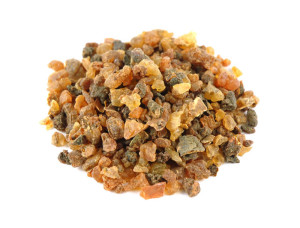Myrrh is a sap-like substance (resin) that comes out of cuts in the bark of trees. Myrrh is used to make medicine.
Contents
Uses
- Myrrh is used for indigestion, ulcers, colds, cough, asthma, lung congestion, arthritispain, cancer, leprosy, spasms, and syphilis. It is also used as a stimulant and to increase menstrual flow.
- Myrrh is applied directly to the mouth for soreness and swelling, inflamed gums (gingivitis), loose teeth, canker sores, bad breath, and chapped lips. It is also used topically for hemorrhoids, bedsores, wounds, abrasions, and boils.
- In foods and beverages, myrrh is used as a flavoring component.
- In manufacturing, myrrh is used as a fragrance, in incense, and as a fixative in cosmetics. It is also used in embalming.
Benefits
- Antioxidant benefits – a study published in the prestigious journal Food and Chemical Toxicology found that myrrh (Commiphora molmol) emulsion was able to protect against lead (PbAc)-induced hepatotoxicity.
- Anticancer properties – a group of Chinese researchers revealed that extracts and compounds from Commiphora myrrha resin may be effective against human gynecologic cancer cells. Their findings were published in the Journal of Medicinal Plants Research.Despite a current lack of scientific evidence, many people use myrrh for treating:
- Cough
- Asthma
- Indigestion
- Ulcers
- Sore throat
- Congestion
- Hemorrhoids
- Joint pain.
Cautions
- Fever: Myrrh might make a fever worse. Use with caution.
- Heart problems: Large amounts of myrrh can affect heart rate. If you have a heart condition, get your healthcare provider’s advice before starting myrrh.
- Surgery: Since myrrh might affect blood glucose levels, there is a concern that it might interfere with blood glucose control during and after surgery. Stop using myrrh at least 2 weeks before a scheduled surgery.
- Systemic inflammation: If you have systemic inflammation, use myrrh with caution, since it might make this condition worse.
- Uterine bleeding: Myrrh seems to be able to stimulate uterine bleeding, which is why some women use it to start their menstrual periods. If you have a uterine bleeding condition, use myrrh with caution, since it might make this condition worse.
Interactions
- Medications for diabetes (Antidiabetes drugs) interacts with MYRRH
Myrrh might decrease blood sugar. Diabetes medications are also used to lower blood sugar. Taking myrrh along with diabetes medications might cause your blood sugar to go too low. Monitor your blood sugar closely. The dose of your diabetes medication might need to be changed.
Some medications used for diabetes include glimepiride (Amaryl), glyburide (DiaBeta, Glynase PresTab, Micronase), insulin, pioglitazone (Actos), rosiglitazone (Avandia), chlorpropamide (Diabinese), glipizide (Glucotrol), tolbutamide (Orinase), and others. - Warfarin (Coumadin) interacts with MYRRH
Warfarin (Coumadin) is used to slow blood clotting. Taking myrrh might decrease how well warfarin (Coumadin) works to slow blood clotting. This could increase the chance of blood clotting.
Other names
N/A
References
Source: WebMD, http://www.webmd.com/vitamins-supplements/ingredientmono-570-myrrh.aspx?activeingredientid=570&activeingredientname=myrrh
Medical News Today, http://www.medicalnewstoday.com/articles/267107.php

